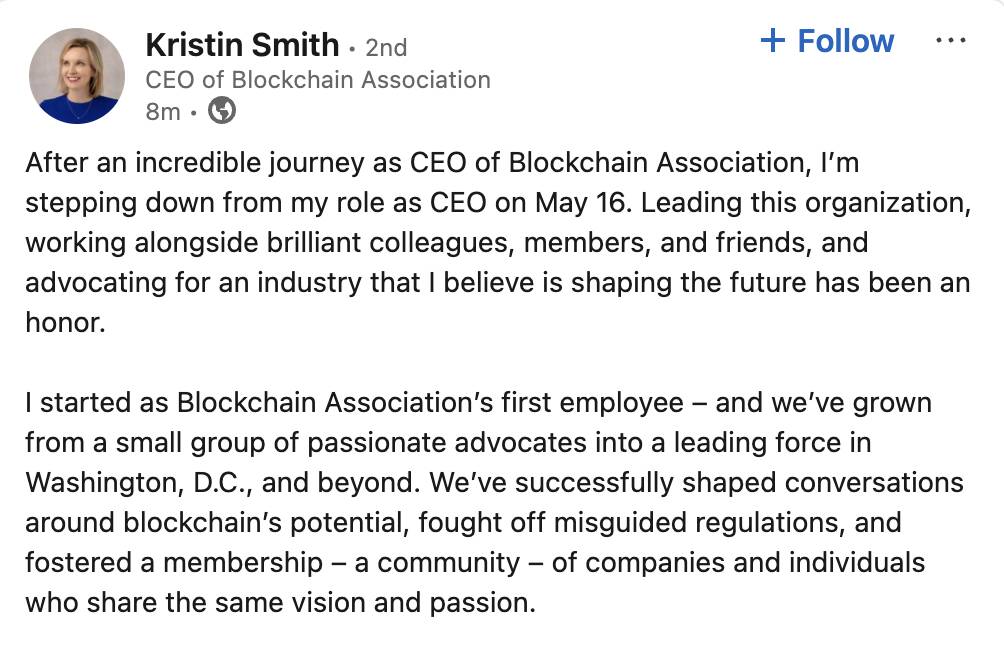In a significant shake-up within the cryptocurrency advocacy sphere, Kristin Smith, the current CEO of the Blockchain Association, has announced her departure to lead the newly established Solana Policy Institute. This transition, effective May 16, was officially communicated on April 1, with Smith set to take on the role of president at the Solana-focused organization just days later, on May 19. The Blockchain Association, which has been a critical player in the crypto industry since its formation, did not provide specific insights into the reasons behind Smith’s move or who will succeed her at the helm.
Smith has been a cornerstone of the Blockchain Association since 2018, bringing her experience from her previous role as deputy chief of staff for former Montana Representative Denny Rehberg. Her new leadership position follows closely in the footsteps of Miller Whitehouse-Levine, who recently departed from the DeFi Education Fund to become CEO of the Solana Policy Institute. This newly launched entity aims to bridge the gap between the burgeoning world of Solana and U.S. policymakers, seeking to educate them about the platform’s potential and benefits.
“The organization plans to educate US policymakers on Solana,” said Whitehouse-Levine, echoing the initiative’s commitment to enhancing understanding within legislative circles.
The Blockchain Association itself has been at the forefront of advocating for fair policies in the ever-evolving cryptocurrency landscape. With members that include major players like Coinbase and Ripple Labs, the group has taken a legal stand against the U.S. Internal Revenue Service, contesting regulations that demand brokers report crypto transactions. Furthermore, they have voiced concerns over the previous SEC regime, criticizing its “regulation by enforcement” tactics that have burdened companies with excessive legal fees.
As the Solana Policy Institute gears up for its advocacy efforts, industry watchers are left to speculate on its immediate objectives and overall impact. Positioned as a non-partisan, nonprofit group, the organization’s presence will likely add another layer of complexity to the ongoing dialogue surrounding cryptocurrency regulations in the United States.
Kirstin Smith’s Transition from Blockchain Association to Solana Policy Institute
This article discusses Kristin Smith’s upcoming departure from the Blockchain Association to lead the newly established Solana Policy Institute. Here are the key points to consider:
- Leadership Change:
- Kristin Smith will step down as CEO of the Blockchain Association on May 16.
- She will assume the role of President at the Solana Policy Institute starting May 19.
- Background of Kristin Smith:
- Joined the Blockchain Association in 2018.
- Previously served as deputy chief of staff for former Montana Representative Denny Rehberg.
- Solana Policy Institute’s Mission:
- Aims to educate U.S. policymakers about Solana.
- Positioned as a non-partisan nonprofit group.
- Controversies and Legal Challenges:
- The Blockchain Association has faced legal challenges, including a lawsuit against the IRS related to crypto transaction reporting regulations.
- Criticism towards the SEC’s approach to cryptocurrency regulations under former chair Gary Gensler.
- Industry Dynamics:
- The leadership change reflects ongoing shifts within the cryptocurrency advocacy landscape, specifically toward Solana.
- Uncertainty exists regarding the immediate objectives of the Solana Policy Institute in engaging lawmakers.
The transition of key leaders in crypto advocacy groups may impact regulatory approaches and industry growth, ultimately affecting investors and businesses within the space.
Examining Kristin Smith’s Transition from Blockchain Association to Solana Policy Institute
The recent announcement of Kristin Smith stepping down as CEO of the Blockchain Association to head the newly established Solana Policy Institute marks a significant shift within the cryptocurrency advocacy landscape. While this transition could invigorate the Solana ecosystem, it also highlights competition between advocacy groups in a rapidly evolving regulatory environment.
Competitive Advantages: Smith’s move could provide the Solana Policy Institute with immediate credibility and experience, given her extensive background in policy and advocacy. Her established connections within the crypto community and familiarity with the complexities of cryptocurrency legislation can enhance the organization’s ability to effectively communicate with U.S. lawmakers. This could position Solana favorably as a leader in blockchain innovation, especially during a period when lawmakers are pushing for clearer regulations surrounding various crypto technologies.
By embracing a non-partisan framework, the Solana Policy Institute may attract a broader base of support compared to other organizations that have been criticized for their partisan leanings. This strategy could resonate well with stakeholders looking for a more neutral voice in the contentious regulatory landscape.
Disadvantages: On the flip side, the abrupt leadership change at the Blockchain Association raises questions about continuity and strategic direction, especially given its recent legal challenges against the IRS and the SEC. The lack of a clear successor or interim leadership might breed uncertainty among its members—organizations like Coinbase and Ripple that rely on strong advocacy in this uncertain regulatory climate. The transition period could distract from critical initiatives and weaken the association’s lobbying power as it faces aggressive enforcement actions from regulators.
This dual scenario may cast Solana in a more competitive light but could also lead to unintended challenges. For instance, the organization’s immediate ambiguity regarding its goals might hinder swift action on pressing issues including stablecoin regulations, especially with significant legislative developments on the horizon. Stakeholders within the crypto space, such as exchanges and blockchain developers, may find themselves in a precarious position as they navigate conflicting advocacy outputs from groups with different priorities.
Ultimately, while Kristin Smith’s leadership at the Solana Policy Institute offers exciting opportunities and strengthened advocacy for Solana, it simultaneously poses potential risks to the Blockchain Association and its member organizations, all of which must adapt to a landscape marked by shifting allegiances and uncertain regulatory narratives.
















